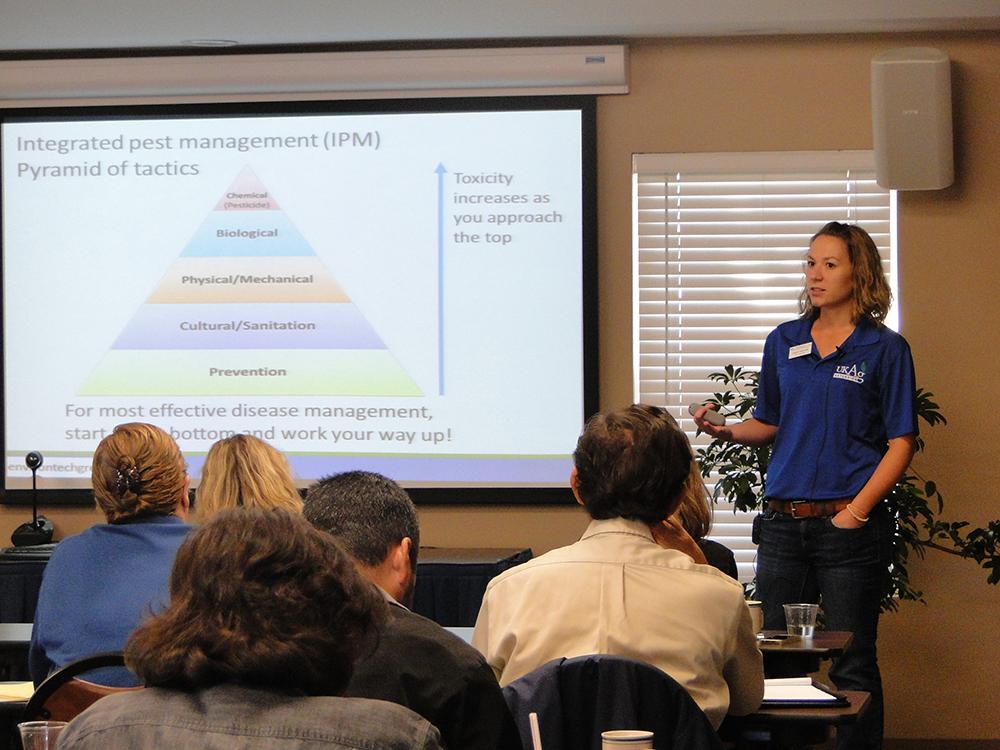Educational Programs
Training Extension Agents & Specialists

Training County Extension Agents and Extension Specialists is a high priority for plant pathology specialists.
Commodity Groups
- Forages
- Forest trees
- Fruit
- Grains
- Greenhouse systems
- Hemp
- Nursery crops
- Ornamentals
- Tobacco
- Vegetables
Training Tools
- Applied research
- Fact sheets
- Field days
- Blogs, Facebook, and other social media
- Conferences
- Disease surveys
- Newsletters (e.g., Kentucky Pest News)
- Workshops
Workshops
Some specific ways we have trained agents so they could in turn teach farmers and homeowners to recognize and implement disease control and IPM measures for their crops have included:
- Blueberry Production Workshop
- Mycotoxin Workshop
- Pythium Workshop
- Small Fruit Short Course
- Soybean Rust Workshop
- Tobacco Short Course
- Train the Trainer – Urban Forestry Diagnostics workshop series
- Viruses of Horticultural Crops Workshop
Educating Public Clients
We also provide disease information to farmers, agribusiness, and homeowners through:
- Fact sheets
- Blogs, Facebook, and other social media
- Conferences
- Disease surveys
- Hotlines
- Listservs and email alerts
- Newsletters (e.g. Kentucky Pest News)
- Videos
- Websites
- Workshops and field days
Many of the educational activities beneficial to county Extension agents and specialists are also available to farmers, agribusiness clients, and homeowners. Some programs intentionally directed to the public have included:
- Certified Crop Advisor Program
- Disease Prediction Models (AgWeather)
- Fungicide Rotations and Prevention of Fungicide Resistance in Orchards and Vineyards
- Grains Crop Academy
- Grain Production Meetings
- Innovative Tobacco Growers
- Kentucky Alfalfa Conference
- Kentucky Blue Mold Warning System
- Kentucky Fruit and Vegetable Conference
- Kentucky Vegetable Academy
- Landscape Pest Management Workshops
- Master Gardener Activities
- Multi-disciplinary Workshop on Mycotoxin Contamination of Corn
- Small Fruit Short Course
- Tobacco Expo
- Tobacco Pesticide, Spray, and Fumigation Schools
- Turfgrass Disease Diagnosis Workshops
Plant Disease Diagnosis
Extension plant pathologists supervise operation of the Plant Disease Diagnostic Laboratory. Located on the main UK campus in Lexington (central Kentucky), the Diagnostic Lab is able to react appropriately to plant disease problems with Extension educational information. The results of the diagnoses and the actions suggested constitute client and agent education. Laboratory observations form the basis for further surveys and research on new diseases. The extent of spread of tobacco blue mold and virus diseases, soybean cyst nematode, dogwood anthracnose, and shade tree bacterial leaf scorch have been documented through the diagnostic laboratory. Field diagnosis and agent consultations are ongoing activities.
Applied Research
Extension educational programs are dependent on research-based answers for plant disease problems. Extension Plant Pathologists are uniquely suited to manage applied research efforts aimed at solving Kentucky plant disease problems. Much of the work is interdisciplinary, e.g., crop variety and plant cultivar resistance and IPM.
Research activities have included:
- Bitter rot of apple, a closer look at the fungi that cause disease, time of infection, and differences in fungicide sensitivities and their effect on disease management
- Effects of fungicides on wheat seedling and foliar diseases
- Elucidating the spread and transmissibility of blueberry mosaic virus
- Evaluating the role of Aphanomyces infections on the establishment of alfalfa stands
- Influence of new transplant production systems on tobacco transplant and field diseases
- Seed transmission of Xylella fastidiosa, causal agent of bacterial leaf scorch in oak
From the results of these and many other studies, we have been able to formulate disease control recommendations for Kentucky producers, and to extend these findings through Extension educational efforts.
